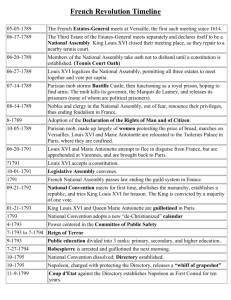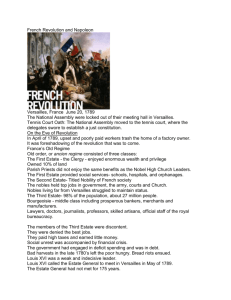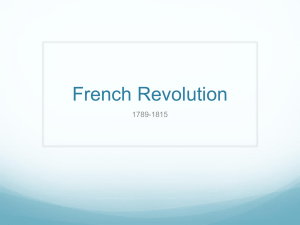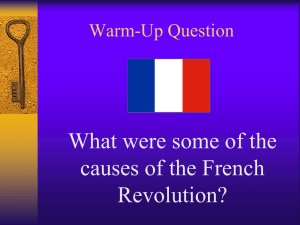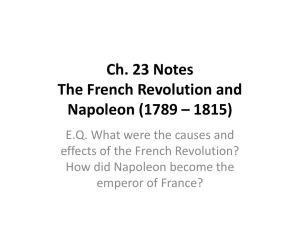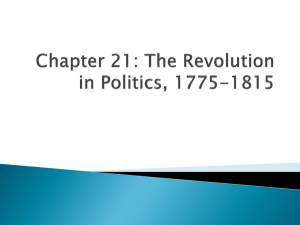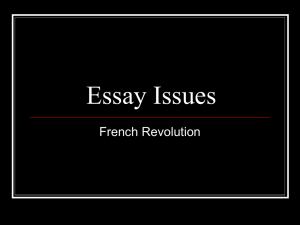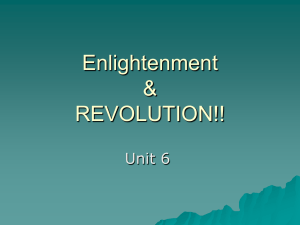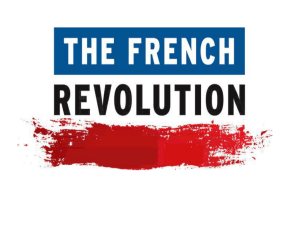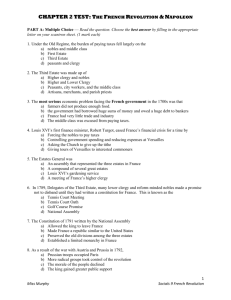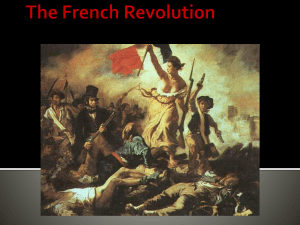The French Revolution (1789-1815)
advertisement
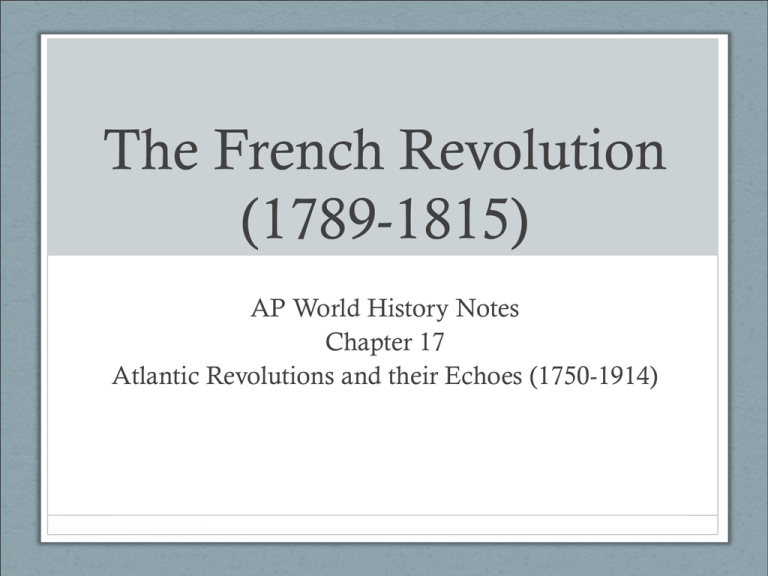
The French Revolution (1789-1815) AP World History Notes Chapter 17 Atlantic Revolutions and their Echoes (1750-1914) French Society • Compromised of 3 “estates” = legal orders • Estate 1 = the clergy = 1% of the population • Estate 2 = the nobility = 1% of the population • Estate 3 = the commoners = 98% of the population • King of France at this time = King Louis XVI • His wife = Marie Antoinette King Louis XVI Marie Antoinette The State of France • On the brink of bankruptcy and government in debt • Commoners upset with higher prices of goods and an increased cost of living • Wealthy upper/middle class (bourgeoisie) = wanted more political power The State of France • King Louis XVI wanted to reform the tax system to make it more equal and efficient • At the time = clergy, nobility, and government officials = exempt from paying taxes • He called into session the Estates General = an ancient representative body • Consisted of representatives from the 3 estates • Each estate gets 1 vote Opening of the Estates General at Versailles -- May 5, 1789 The State of France • The 1st and 2nd estates could easily outvote the 3rd estate and voted against these tax reforms • 3rd estate thought this was unfair wanted to reform government so that votes were based on each representative, not on each estate Meeting of the Estates General in 1789 • King refused because he didn’t want the lowest class to control everything • Result = 3rd estate broke away and formed its own organization = the National Assembly The National Assembly • Met at indoor tennis court & swore the “Tennis Court Oath” = promised they wouldn’t disband until they had written a new constitution for France Painting of the National Assembly convening at an indoor tennis court The National Assembly • Drafted the “Declaration of the Rights of Man and Citizen” • Influenced by the Declaration of Independence • Said all people were created equal • Guaranteed freedoms of speech, press, and religion Revolution in the Air • King Louis XVI sensed trouble and called for more troops to protect Versailles and Paris • Spirit of rebellion was everywhere – from the meetings of the National Assembly to the streets of Paris The Gathering of French Troops The Fall of the Bastille • Bastille was a prison in Paris • Symbolized the injustices of the monarchy • Mob stormed the Bastille on July 14, 1789 • The prison fell and prisoners were freed The Great Fear • More violence followed = called the Great Fear • Peasants armed themselves and prepared for a revolution • Peasants attacked the castles of their lords • Fields and crops burned • Documents of dues and payments burned • Buildings attacked and destroyed End of the Old Order • In an effort to end the violence: • Nobles gave up their aristocratic privileges • Nobles gave up their tax exemption • Feudalism abolished • Agreement that all male citizens could hold offices in the government, army, or church End of the Old Order • Church lands = sold to raise revenue and pay government debts • National Assembly passed the Civil Constitution of the Clergy = put French Church under government control; weakened the Catholic Church Cartoon Representation of the Confiscation of Church Lands March on Versailles • Despite these changes, King Louis XVI sill refused to accept the Declaration of Rights and recognize the National Assembly • March on Versailles led by women who were upset with harsh economic conditions and bread shortages • Marched to the King’s palace and demanded he move the court to Paris wanted him to show support for the new Assembly March on Versailles • Huge mob joined with pitchforks and torches • Guards couldn’t fight off the thousands of people • King Louis XVI agreed to move to Paris French Constitution of 1791 • Kept the monarchy but limited its power • Set up a unicameral legislature • One-house assembly • Members chosen by the voters • New constitution led to more unrest some thought it went too far, others thought it didn’t go far enough • Violence continued throughout the countryside • Fear of breakdown of law and order Decline of the Monarchy • In 1791 = King Louis XVI and Marie Antoinette tried to escape Paris and go to Austria • Feared more violence • Were arrested before they got very far • Forced to return to Paris Escape Attempt of the Royal Family in June of 1791 The French Republic (1792) • France attempted to create a whole new society • Created a new government = a republic • Wrote a democratic constitution • Passed universal male suffrage = every man could vote “Lady Liberty” Leading the People • New calendar with “Year 1” in 1792 = marking a new start for France The French Republic • The new Republic had to decide the fate of King Louis XVI • Tried and convicted him of treason and conspiring against the nation • Beheaded on the guillotine in 1793 • Crowds celebrated his death Marie Antoinette met the same fate years later The Reign of Terror (17931794) • Began after the execution of Louis XVI • Led by Maximilien Robespierre and his Committee of Public Safety • Traitors and enemies of the revolution = executed with the guillotine • An estimated 40,000 people were killed in this 1 year The Reign of Terror (17931794) • Robespierre was soon arrested himself • Accused of leading France into tyranny and dictatorship • Executed with the guillotine Execution of Maximilien Robespierre Spreading the Revolution • Other European leaders feared the French Revolution would spread to their countries • These countries united against the new French government • Austria, Prussia, Great Britain, Spain, and the Netherlands • In response = France issued a conscription order = a draft • Men between 18 and 45 had to serve in the military Napoleon Bonaparte • French military leader • Seized power in 1799 and ruled France until 1814 • He and a group of men led a coup d’etat = quick seizure of power of the government • Napoleon tamed the French Revolution in the face of growing issues with its more radical features • Named himself emperor of France in 1804 Restoring Order to France • Napoleon preserved many elements of the French Revolution • Set up a national school system • Created the Bank of France • Required that all citizens pay taxes • Maintained civil equality • Secular (non-religious) law code • Religious freedom Napoleon’s Empire • Napoleon wanted to spread the benefits of the French Revolution through military conquests and the building of an empire • By 1812 = Napoleon controlled most of Europe Napoleon’s Empire • Revolutionary practices imposed within his empire: • Ending of feudalism • Equality of rights • Religious toleration • Uniform, secular law codes Downfall of the Empire • Conquered countries resented French rule and began revolting • 1812 = Failed invasion of Russia • Napoleon’s troops marched into Moscow • French troops couldn’t handle the harsh winter • As they finally withdrew, Russians attacked • 400,000 of the 600,000 French soldiers died • Battle wounds, starvation, exposure to cold, etc. Napoleon’s Retreat of Moscow Downfall of the Empire • Several of Napoleon’s conquered nations successfully won back their freedom • Final defeat of Napoleon = at the Battle of Waterloo on June 18, 1815 • He was exiled to an island in the South Atlantic where he died several years later The Battle of Waterloo • Marked an end to the era of the French Revolution
